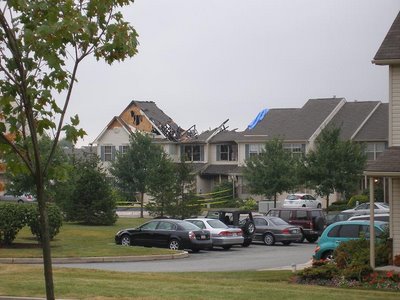Of House and Home
 Quick screenwriting-related note before we get into today's tangent: my local peers and I have been thinking structural thoughts lately, and sometimes these turn to issues of antagonist versus protagonist. Strangely, I'm finding more and more films that don't feature a singular antagonist, the "bad guy," but instead pit Our Hero(es) against the broader "forces of antagonism." Little Miss Sunshine? No antagonist. Just a family falling apart and our society's cult of winning. Invincible? No antagonist. Just darn-near-impossible odds and a mopey neighborhood chum. Both were surprisingly effective films. Even Lawrence of Arabia, which I watched for the nth time recently. No antagonist, at least not in the usual sense. You can make a case for Sherif Ali, I suppose, but really the conflict begins and ends with Lawrence himself.
Quick screenwriting-related note before we get into today's tangent: my local peers and I have been thinking structural thoughts lately, and sometimes these turn to issues of antagonist versus protagonist. Strangely, I'm finding more and more films that don't feature a singular antagonist, the "bad guy," but instead pit Our Hero(es) against the broader "forces of antagonism." Little Miss Sunshine? No antagonist. Just a family falling apart and our society's cult of winning. Invincible? No antagonist. Just darn-near-impossible odds and a mopey neighborhood chum. Both were surprisingly effective films. Even Lawrence of Arabia, which I watched for the nth time recently. No antagonist, at least not in the usual sense. You can make a case for Sherif Ali, I suppose, but really the conflict begins and ends with Lawrence himself.I don't know why the missing antagonists surprise me so much. Maybe I just wasn't looking before. Maybe it's something you take for granted until you're staring at an incomplete bulleted list of scenes that purports to tell a story. Now don't you worry none. The Norse epic has an antagonist, forces of antagonism, the whole kit. But I . . . what's the opposite of digress?
So. The tangent. Friday afternoon I'm at the gym, just about ready to hit incline dumbbell presses, when Laura the Whimsical Desk Girl wends her way over to the free weights area. "Your wife," she says whimsically, "is on the phone."
Now maybe my body's a temple, maybe not, but the workout itself is something that just isn't interrupted. (Of course, I remain stubbornly and lazily cellphoneless, which means that I'm not gonna just pick up the comlink and engage in idle chitchat between sets. You know who you are.) If Jenifer calls during this time, it's generally a double plus ungood thing.
And how. Seems a couple townhouses across the street were burning. Five fire companies arrived, but in the end two units were destroyed, as well as part of a third. No humans were hurt, but one family lost several cats, dogs, and a lizard. When I pulled into the community, you'd have thought a neighborhood festival was on, with everyone roaming the streets. The atmosphere was nearly festive, though I knew better, and when I parked the car I saw the damage. It looked like a meteor had shot right through the building.
Later, more disturbing news. In a windstorm that bypassed our neck of the woods, a tree had fallen on a friend's house, crushing his second floor.
 Fortunately, he escaped through a window, but now his years of careful planning and design are suddenly gone. And this during a weekend when Jenifer and I had family and friends over to see the changes we'd made to our house, and the photographs from our trip to Scandinavia. A strange contrast, and I was thankful we'd been spared. It could have been us. Sometimes our greatest challenges manifest in peculiar ways, and one of those high school literature lessons comes rushing back: Man versus Nature. Sometimes the forces of antagonism are quite enough.
Fortunately, he escaped through a window, but now his years of careful planning and design are suddenly gone. And this during a weekend when Jenifer and I had family and friends over to see the changes we'd made to our house, and the photographs from our trip to Scandinavia. A strange contrast, and I was thankful we'd been spared. It could have been us. Sometimes our greatest challenges manifest in peculiar ways, and one of those high school literature lessons comes rushing back: Man versus Nature. Sometimes the forces of antagonism are quite enough.

2 Comments:
Sometimes I go back and forth about antagonist in my football story. In the end, an individual player, the coach, and the entire team can have antagonistic properties, but the real antagonist lies within the main character.
In that case, I wonder if the illustration of this is the choices your character makes. If they are at war with themselves, they may tend to take the wrong side of make the wrong decisions.
I think we as screenwriters want our antagonist to be a single person or group, because we might feel that it is expected or that without that our story will be without meaningful conflict. Stories come in all shapes and sizes. I dare say there are many engaging stories that don't involve a classic antagonist.
Right. I think my perception here is also an illustration of what Simons and Chabris call "inattentional blindness," wherein we don't even see things or ideas on which we don't focus our attention.
Didn't see that coming, did ya? Pay attention.
Seriously, now that I've given some thought to the nature of antagonism (he says omnipotently), I'm seeing films all over the place that dispense with a traditional hardcase.
And for more value-add, see the following: http://www.futurecatalyst.com/about/index.html
Post a Comment
<< Home